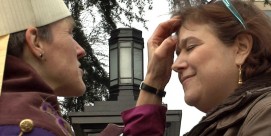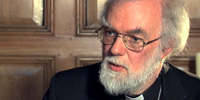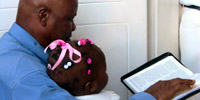In This Episode << SLIDE LEFT TO SEE ADDITIONAL SEGMENTS
Bishop Mark Lawrence
Read more of Kim Lawton’s interview in Canterbury at the Lambeth Conference with Episcopal Bishop Mark Lawrence of South Carolina:
Q: What is your overall impression of the type of conversation that’s been taking place here?
A: Oh my, well, I would say it, you know, we’re in a process, and a process like the one we’re in always includes a need for prudence and guidance, prudence because you don’t want to interrupt the process as it unfolds. You want to be patient, you want to participate, you want to let something emerge. [But] if one senses that we’re on a wrong trajectory, if we don’t think we’re getting where we need to get, then we may need to say something or say wait a minute, I think that unless we correct the path we’re on we may get up [at] the end of the day having nothing accomplished — structured superficiality, and in that structured superficiality we may have produced nothing in the end of the day, though involved ourselves in a lot of time, effort, money, and personal sacrifice. So I’m still testing to see if this is going to produce what we need at the end of the day, and the answer’s not there yet.

Bishop Mark Lawrence |
Q: We’ve been hearing a lot that this time around Lambeth is a conversation. Do you feel people are really listening to each other and are taking in different points of view?
A: Oh, I think so, at different levels, and I think there’s a tendency to kind of peel off, like the layers of an onion, the concerns that each of us brings to the conversation, and then there’s a tendency to back off. It’s like we’ve entered into the pain that divides us, and now we don’t know if we want to continue this or not. It’s getting too tense, it’s — so there is that ebb and flow in this conversation. I would say also that from my standpoint as a bishop, as a new bishop underneath this whole church, the conversations with my brother bishops from Sudan and their wives from Sudan, from Ghana and places of great hardship has broken my heart on more than one occasion and suggested that, though I already have as much weight as I need to have, as many responsibilities as I need to have, do I really need their burdens placed upon me? And yet as God deepens our responsibilities I trust that he enables our shoulders to bear that responsibility as the need is placed upon us, so I’ve found myself making links with people that I want to continue. How can I forget their problems, how can I forget their sufferings when I return back home? And I need their clarity, their connection, their courage in the midst of persecution, in the midst of difficulties, in the midst of the overwhelming demands that pale — causes the mind paleness.
Q: Are you getting a sense of the diversity within the Communion?
A: Oh, the cultural context from which people come — it boggles the mind and expands the heart, and so absolutely.
Q: There has been a lot of talk about Anglican identity and what is it that truly makes an Anglican. Is that up for debate?
A: I honestly have to say that my sense of being an Anglican hasn’t changed at all. I would say my grasp — the breadth has deepened, and the depth of the need for our relationship to continue and to go to that next level of fellowship, but my understanding of Anglican identity hasn’t changed.
Q: Do you think it’s changing around you, though?
A: I haven’t the slightest idea. I would hope that it is, but maybe that’s presumptuous. Maybe they have as good a grasp of what they think Anglican identity is.
Q: You’re in a diocese that’s been uncomfortable with some of the things that have been going on in the US church. How has that placed you here in the conference? How are you fitting into the conversations?
A: Well, it’s an interesting experience because on a local level, that is, within the Episcopal Church USA, I’m in a minority position. In a conference like this I find myself in a majority, although not all, when they are introduced to me and then I say I’m from the Episcopal Church — sometimes they’re a little cautious as to where I am. They don’t know how quite to deal with me, and as we begin to talk, certain things are said in the conversation that enables them to understand that I’m not with the majority opinion, and then there is an equal level of fellowship that follows.






